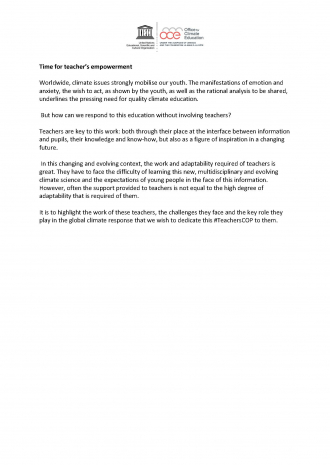On 30 October the Office for Climate Education (OCE) hosted the first ever #TeachersCOP, live from Glasgow as part of the COP26. During this event, hundreds of teachers voted together to adopt a Statement on Climate Change Education, which included input from teachers from around the world.
Time for teacher’s empowerment
Worldwide, climate issues strongly mobilise our youth. The manifestations of emotion and anxiety, the wish to act, as shown by the youth, as well as the rational analysis to be shared, underlines the pressing need for quality climate education.
But how can we respond to this education without involving teachers? Teachers are key to this work: both through their place at the interface between information and pupils, their knowledge and know-how, but also as a figure of inspiration in a changing future. In this changing and evolving context, the work and adaptability required of teachers is great. They have to face the difficulty of learning this new, multidisciplinary and evolving climate science and the expectations of young people in the face of this information.
However, often the support provided to teachers is not equal to the high degree of adaptability that is required of them. It is to highlight the work of these teachers, the challenges they face and the key role they play in the global climate response that we wish to dedicate this #TeachersCOP to them.
The idea of the TeachersCOP is to give a voice to teachers at the COP. To this end, the OCE brought together teachers from different countries and gave them the opportunity and space to reflect on the current situation and context of climate change education. The result of this work is presented below. By taking into account the reality of their profession, teachers share with us their concrete proposals for improving climate change education. Thus, in the remainder of this text, the use of the term "we" refers to "the teachers".
To facilitate understanding, the different proposals discussed are separated into the following 4 categories:
- School programs
- Professional development of teachers
- Educational resources
- The place of school in the context of climate change
The main proposals retained among the different teacher groups are then presented.
School Programs
The implementation of climate change in school curricula must be thoroughly rethought. Due to the overload of work caused by already loaded programs, this teaching cannot be added only as an additional subject to an already existing program.
We therefore wish for :
1.1 A much greater consideration of climate change in the programs, which can be imagined in two different ways: either by creating strong links between the subjects taught and climate change, or by completely rewriting the programs by handing over this teaching to the heart of the program.
1.2 That it be taken into account in the curricula the cross curricular and multidisciplinary aspect of climate change.
1.3 A theoretical teaching approach but also and above all practical, through the development of projects, working time on active pedagogies, and disciplines more connected with reality.
1.4 Greater collaboration between education and environment ministries to work on curriculum reform.
1.5 Programs designed to be inspiring for future generations!
Professional development of teachers
The professional development of teachers is very much linked to the reflection around the role of the teacher within the school. The desire to provide a quality education should be a driving force in fostering professional development and career advancement. Because school is not just a place where children are welcomed, but above all a place where they learn about life.
Likewise, in rethinking teacher training, it is necessary to take into account both the content of the programs for greater consistency, but also to ensure that free time is allocated to this training.
We therefore wish for:
2.1 To use the time now dedicated to teaching to offer lengthy training courses for teachers already in place. The approach must be multidisciplinary and must be encouraged by support from both trainers, experts and scientists
2.2 Include climate change as early as initial teacher training, because in the first cycles, a large majority of teachers come from non-scientific literary fields
2.3 A consideration during training of pedagogical approaches and the management of emotions in students. They should also give teachers the opportunity to express their own feelings about climate change and offer tools to manage them.
2.4 To make these training places of connection between teachers, but also with experts, civil society actors, etc ...
2.5 To rethink the training moments for teachers during school hours. These times can then be transformed into projects or concrete activities followed by the students in connection with climate change.
Resources
As mentioned earlier, it is essential to think of resources and professional development as a whole. These training times must also be dedicated to the presentation of resources that can be used directly in the classroom. The increasingly developed digital format is not always the best suited to the needs of teachers and the paper medium should be favored.
We therefore wish for:
3.1 To have easy and centralized access to educational resources validated by scientific and educational experts, co-constructed with teachers and tested in the classroom.
3.2 To facilitate lists of reference persons for teachers, who can support them both for their professional development, but also during their projects.
3.3 Resources based on local realities and therefore adapted to the different contexts of the students.
3.4 Practical resources to address essential themes such as eco-anxiety, as well as materials for assessing local realities such as the carbon footprint and the ecological impact in general.
3.5 The establishment of platforms for the exchange of good practices, existing resources, examples of the implementation of projects in the classroom
The role of school in the climate context
Students spend more than half of their time in school. It is therefore urgent to revalue the school and its proper role in society. The education that is promulgated must be more valued and promoted.
In this context, we would like to :
4.1 Make school an inspiring place, representing the path to be followed by society on good practices in the fight against climate change. The reflection must be done both on the education of the students but also on the functioning of the school itself
4.2 The creation of a strong link between the school, students, parents of students, and local actors (political or not) to allow schools to be taken into account in local decisions.
4.3 Make school a place where students can change their behavior, and encourage thinking about solutions. The school must be inspiring, reassure the students and allow them to project themselves into the future.

